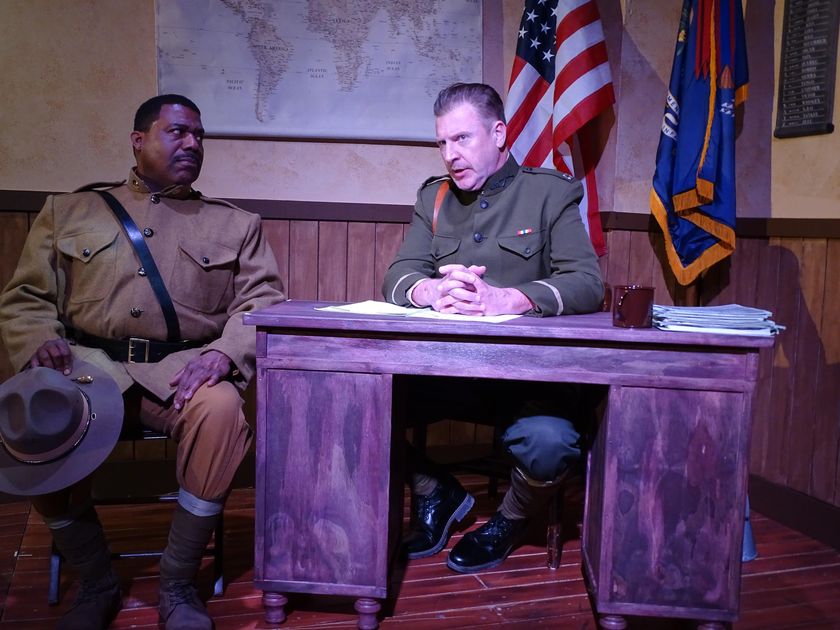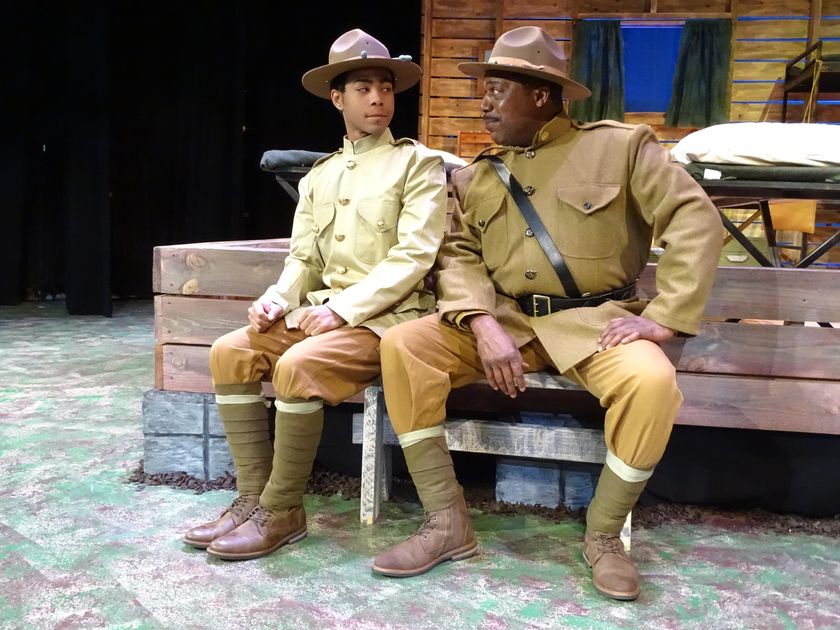- Sections :
- Crime & Public Safety
- Restaurants & Food
- Sports
- More
The Ensemble Theatre's 'Camp Logan': Powerful, Emotional, and Hopeful
HOUSTON, TX -- Back in the early months of the United States entry into World War I, in mid-summer 1917, Houston, Texas was bathed in a different light when it came to dealing with race relations. The keeping of the peace was held by the all-white Houston Police Department, which wielded their big stick of so-called ‘justice,’ with the power of life or death over the Black folk of the town. When colored troops of the U.S. Army arrive to guard the perimeter of the newly designated Camp Logan in late July ‘17, tensions start to rise between the soldiers, HPD and the white citizens. The Ensemble Theatre in Midtown-Houston, in the third show of their 2024-2025 Season, humbly accepted the challenge of the first Houston showing of ‘Camp Logan,’ a play written by the Bayou City based writer, Celeste Bedford Walker, whose work has been a success across the nation. And quite frankly, if this play doesn’t give you goosebumps, you weren’t watching hard enough.
The play begins when white Captain Zuelke, the white company commander of Co. I, 3rd Battalion, of the 24th Infantry Colored Regiment appears in front of his soldiers to address an irate crowd and reassure the white citizens of Houston, that their city will not go the way of the 1906 ‘Brownsville Incident.’ An affair that happened when an alleged group of Black soldiers harassed a white woman, and were accused of killing a white bartender in the city. The white commanders found no evidence of Black soldier involvement in the death, yet President Theodore Roosevelt ordered the dishonorable discharges of 167 Black soldiers.
The situation in Houston was much different. The Army acquiesced to all the demands of City of Houston leaders and police, stating that Black soldiers were not to have their weapons loaded while on duty. They also demanded that Black Military Police were not to be armed while on duty monitoring Black soldiers on their off hours. The white commanders allowed the Black public to visit, and the local Black newspaper, the Texas ‘Freedman Press,’ called the Black soldiers “heroes.” Shortly after Captain Zuelke’s speech, the soldiers are marched to their barracks, where Zuelke briefs his troops on the rules for engagement while on guard duty, and how they were to conduct themselves when out amongst the townsfolk, white and otherwise.
When in the barracks, we get to meet the troops, and see how they talk amongst themselves, and it’s really no different today, as it has been throughout the decades since. The introductions start with Charles Hardin (Elia Adams), from Minnesota, the land of many lakes, but few Black families. Hardin quits college to join the 24th. He’s smart, speaks proper English, a little shy, and his fellow soldiers kid with him, but the men love him enough not to lead him astray. Robert Franciscus (Christopher Adams) is a devoted soldier, the Military Policeman (MP) of the group, and a good soldier who follows the rules. He has a local girlfriend, Priscillia, a preacher’s daughter, and takes the ribbing from the guys about her, all done in fun. Joe Moses (Kendrick Brown), is from New Yorker with a chip on his shoulder, and is not used to southern whites and their attitudes towards Black soldiers or civilians. He quickly finds out about the ‘Jim Crow’ south, and with run-ins with the local tram conductor strictly forbidding him access to sit in ‘white’ seating, or not allowing him to board the vehicle altogether, the accounts begin to build Moses’ frustrations. Sgt. McKinney (Jason Carmichael) is the group’s illiterate leader; he is Army and nothing but Army, having spent over half of his life, 22-years in the armed forces, with multiple generations of family doing honorable service for the Nation. McKinney served with Captain Zuelke in The Philippines, when the officer saved his life, when McKinney was threatened with execution. Captain Zuelke (Foster Davis), is the company commander, and he and McKinney hail from Kentucky. Cap comes up from the ranks, and bonds with McKinney, yet he holds deep secrets that will later lead to disaster. Jacques ‘Bugalossa’ Honore (Tanner Thomas Ellis), New Orleans born, and survivor of a previous lynching attempt. He loves to drink, and is part of a minstrel show, but is frustrated in being forced to have to wear ‘Black Face’ in the performances. Then there is Gweely Brown (Roc Living), he loves women, and loves the girl of the Houston Police Officer O’Reilly, the meanest of the HPD.
The soldiers really are a great bunch of guys, from different parts of the nation. Some are familiar with Jim Crow, others not, but what they really want to do is ‘Kill the White Man,’ meaning ‘The Hun,’ the German soldiers, since they are expecting to deploy to France as part of the Expeditionary Forces. They are truly heroes, some having seen service in the Spanish-American War in Cuba, and in the Philippines during the Americans war on those islands. Their brothers and fathers fought in the Indian Wars, but with their latest action during the Pancho Villa Expedition, they were expecting to be respected just a little bit by the whites in town. After all, they fought in the same armed forces that those same people support. The guys in Company I were not in some labor battalion, these men really battled on the field of honor.
Over the next few weeks, Houston and Memorial Park, where Camp Logan was located from 1917-1919, was a bubbling caldron of racial feelings. The soldiers in the barracks tell their own stories about their earlier encounters with white soldiers and civilians, where even in Houston of that day, a little girl could berate their Black servants in public. It was a complete shock to the soldiers from the north. Black soldiers at Camp Logan were being betrayed by their commanders, and the white public of the time, leading to constant arrests. The racial climate of the day was literally dry brush facing a flame, and with the realization of personal and command betrayals of the Black soldiers, it all leads to mindsets that force out will power leading to distorted views of reality, fueled by anger. A state of mind that can’t be controlled rationally.
Director Allie Woods, Jr. did an excellent job commanding his troops on stage. Incredibly, none of the actors served in the military, but thanks to military consultants, Captain Paul Mathews and Winston Savice, Jr., the actors' mannerisms were spot on. Jason Carmichael’s portrayal of Sergeant McKinney was extraordinary, having any Veteran in the audience no doubt remembering their own drill sergeants from their training days. Also of note was Foster Davis’ playing of the white antagonist Captain Zuelke. It takes guts to play the representative white betrayer in a Black theater, but Davis was spot on as well. Kudos go out to fight coordinator Kelvin Hamilton and costume designer Krystal Uchem. Set designer Philip Graschel definitely did his research and was right on with the barracks that would have had wooden sidings with a canvas cover.
I highly recommend this play, finding its performance up to the moment of the riot itself as a plausible explanation of the true events that play out. The colored battalions of the 24th Infantry Regiment are representative of the brave men who served Our Country, at a time when Our Country did not serve them. Camp Logan taps on our emotions to remind us of how far we have come, that men (and now women) of different races, can grow to love each other on the field of combat, and if necessary sacrifice themselves for their fellow soldiers.
‘Camp Logan’ runs until February 23rd at The Ensemble Theatre. For tickets and donations: ensemblehouston.com
Ruben can be reached at: ruben@montgomerycountynews.net






















